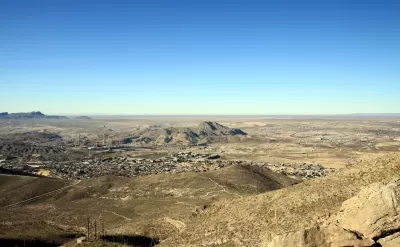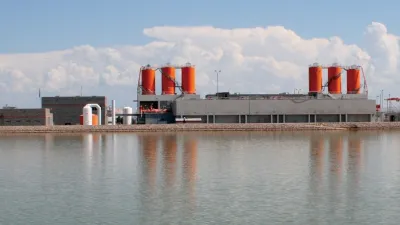Along the Mexican border, Texas "colonias" have often gone without basic infrastructure. Saying it'll cut bureaucracy, Governor Greg Abbott removed funding for a program that helps residents access government services.

Daniel C. Vock discusses the plight of poverty-stricken exurbs along Texas' border with Mexico. "The predominantly poor residents of colonias -- makeshift subdivisions often far outside city limits -- have bought land or cheap houses from unscrupulous developers who promised to eventually install electricity, running water and paved roads." In many ways unheard-of elsewhere in the U.S., residents have been left to their own devices.
There have been efforts to help these neighborhoods. In terms of inadequate infrastructure, "Texas cracked down on the worst offenders in the 1990s, but change has been slow. Many of these communities still lack even the most basic infrastructure systems." Vock goes on, "In 1999, Gov. George W. Bush signed a law that created a state ombudsman program to help colonia residents figure out the myriad programs available to help them."
"But Gov. Greg Abbott this summer effectively terminated Bush's program. [...] The move came as a surprise to many officials who represent border areas with colonias, because there had been almost no talk in recent years of cutting the program." Abbott characterized the program as unnecessary red tape.
According to El Paso County Commissioner Vincent Perez, there's not a lot individual Texas counties can do to help colonia residents. "Texas law [...] prevents counties from imposing zoning requirements on developments that could've prevented many of the ongoing problems with colonias, Perez says." Perez also made it clear that "pressure to address the infrastructure problems in colonias will continue to build, especially in the El Paso area, where the sprawling city is encroaching on once-isolated neighborhoods."
FULL STORY: On the Texas Border, Building Infrastructure Is Hard. Critics Say It's About to Get Harder.

Alabama: Trump Terminates Settlements for Black Communities Harmed By Raw Sewage
Trump deemed the landmark civil rights agreement “illegal DEI and environmental justice policy.”

Study: Maui’s Plan to Convert Vacation Rentals to Long-Term Housing Could Cause Nearly $1 Billion Economic Loss
The plan would reduce visitor accommodation by 25% resulting in 1,900 jobs lost.

Planetizen Federal Action Tracker
A weekly monitor of how Trump’s orders and actions are impacting planners and planning in America.

Waymo Gets Permission to Map SF’s Market Street
If allowed to operate on the traffic-restricted street, Waymo’s autonomous taxis would have a leg up over ride-hailing competitors — and counter the city’s efforts to grow bike and pedestrian on the thoroughfare.

Parklet Symposium Highlights the Success of Shared Spaces
Parklets got a boost during the Covid-19 pandemic, when the concept was translated to outdoor dining programs that offered restaurants a lifeline during the shutdown.

Federal Homelessness Agency Places Entire Staff on Leave
The U.S. Interagency Council on Homelessness is the only federal agency dedicated to preventing and ending homelessness.
Urban Design for Planners 1: Software Tools
This six-course series explores essential urban design concepts using open source software and equips planners with the tools they need to participate fully in the urban design process.
Planning for Universal Design
Learn the tools for implementing Universal Design in planning regulations.
Caltrans
Smith Gee Studio
Institute for Housing and Urban Development Studies (IHS)
City of Grandview
Harvard GSD Executive Education
Toledo-Lucas County Plan Commissions
Salt Lake City
NYU Wagner Graduate School of Public Service





























